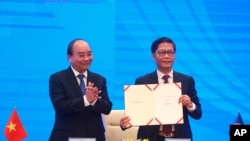Fifteen Asian and Pacific countries Sunday signed the Regional Comprehensive Economic Partnership agreement on the sidelines of the annual Association of Southeast Asian Nations summit.
The agreement, signed virtually, creates the largest trading bloc in the world and includes about a third of global economic activity.
Vietnamese Prime Minister Nguyen Xuan Phuc chaired the summit.
"And I am delighted to say that after eight years of hard work, as of today, we have officially brought RCEP negotiation to a conclusion for signing," he said.
Phuc added that the agreement will help global and regional economies cope with the obstacles and challenges arising from COVID-19 and the resulting decrease in global trade.
“The conclusion of RCEP negotiation, the largest free trade agreement in the world, will send a strong message that affirms ASEAN's leading role in supporting the multilateral trading system, creating a new trading structure in the region, enabling sustainable trade facilitation, revitalizing the supply chains disrupted by COVID-19 and assisting the post pandemic recovery,” he said.
The deal, which was first proposed in 2012, will lower tariffs on trade among the signatories and opens services trade.
RCEP includes the 10 ASEAN countries plus China, Japan, South Korea, Australia and New Zealand, but not the United States.
Analysts see the accord as offering huge advantage for China in extending its influence.













